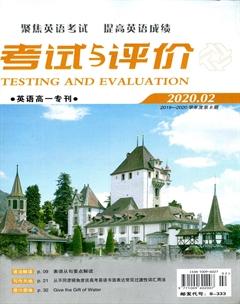阅读理解两篇
徐志伟
A
Americans often greet each other simply with “Hello” or “Hi”. They believe such an informal greeting often implies a close and friendly relationship. Similarly, Americans do not have a formal “farewell”. They will just wave “good-bye” to the whole group. Or perhaps, they will simply say “Bye”, “So long” or “Speaking of time, I've got to run” and then leave. To Americans, a friendly and informal relationship is the most important thing.
Yes, a proper introduction will leave a good first impression upon others. However, American introductions are usually rather simple. In the United States, most people don't like using Mr., Mrs. or Miss in introductions. They find these terms too formal. They prefer first names to formal titles in most cases. For example, a gentleman may say, “Glad to meet you. I'm Miller. But call me Paul.” Sometimes a woman you meet for the first time may say, “Don't call me Mrs. Smith. Just call me Sally.” So when your American friends do not use your last name or titles, don't feel that they have been impolite. They only want to show friendliness.
When you first get to know an American, he may ask you, “Where do you work?” “Are you married?” or “Do you have children?” Such questions may be too personal to Europeans. But Americans do sometimes ask such questions. They would like to get answers to these questions. In this way they can get better acquainted with you and have a topic for beginning conversation with you.
1. What would be the best title for the passage?
A. The Way Americans Greet B. American's Customs
B. How Americans Call Others
D. How Americans Leave a Good First Impression on Others
2. When an American calls your name directly, ____.
A. they want to be simple B. they are angry with you
C. they are impolite D. they want to be friendly
3. From the last paragraph we can see ____.
A. Americans often ask “Where do you work?” “Are you married?” or “Do you have children?”
B. Europeans don't like asking too personal questions
C. Americans are ruder than Europeans
D. Americans don't like being asked personal questions
4. The underlined word “acquainted” (in Paragraph 3) means ____.
A. known B. closed C. respected D. greeted
B
Susan Sontag (1933—2004) was one of the most noticeable figures in the world of literature. For more than 40 years she made it morally necessary to know everything—to read every book worth reading, to see every movie worth seeing. When she was stilt in her early 30s, publishing essays in such important magazines as Partisan Review, she appeared as the symbol of American cultural life, trying hard to follow every new development in literature, film and art. With great effort and serious judgment, Sontag walked at the latest edges of world culture.
Seriousness was one of Sontag's lifelong watchwords (格言), but at a time when the barriers between the well-educated and the poor-educated were obvious, she argued for a true openness to the pleasures of pop culture. In “Notes on Camp”, the 1964 essay that first made her name, she explained what was then a little-known set of difficult understandings, through which she could not have been more famous. “Notes on Camp”, she wrote, represents “a victory of ‘form over ‘content, ‘beauty over ‘morals ”.
By conviction (信念) she was a sensualist (感覺论者), but by nature she was a moralist (伦理学者),and in the works she published in the 1970s and 1980s, it was the latter side of her that came forward. In Illness as Metaphor—published in 1978, after she suffered cancer—she argued against the idea that cancer was somehow a special problem of repressed personalities (被抑制的个性), a concept that effectively blamed the victim for the disease. In fact, re-examining old positions was her lifelong habit.
In America, her story of a 19th century Polish actress who set up perfect society in California, won the National Book Award in 2000. But it was a tireless, all-purpose cultural view that she made her lasting fame. She once said, “I feel that, in the end, all I am really defending... is the idea of seriousness, of true seriousness.” And in the end, she made us take it seriously, too.
1. The underlined sentence in Paragraph 1 means Sontag ____.
A. was a symbol of American cultural life B. developed world literature, film and art
C. published many essays about World culture
D. kept pace with the newest development of world culture
2. She first won her name through ____.
A. her story of a Polish actress B. her book Illness as Metaphor
C. publishing essays in magazines like Partisan Review
D. her explanation of a set of difficult understandings
3. According to the passage, Susan Sontag ____.
A. was a sensualist as well as a moralist B. looked down upon the pop culture
C. thought content was more important than form
D. blamed the victim of cancer for being repressed
4. As for Susan Sontag's lifelong habit, she ____.
A. misunderstood the idea of seriousness B. re-examined old positions
C. argued for an openness to pop culture D. preferred morals to beauty
5. Susan Sontag's lasting fame was made upon ____.
A. a tireless, all-purpose cultural view B. her lifelong watchword: seriousness
C. publishing books on morals
D. enjoying books worth reading and movies worth seeing

